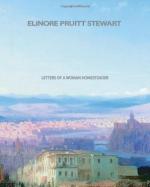At last, when it was quite dark and the horses could go no farther, we drew up before the fire that had been our beacon light. It was a bonfire built out upon a point of rock at the end of the canon. Back from it among the pines was a ’dobe house. A dried-up mummy of a man advanced from the fire to meet us, explaining that he had seen us through his field-glasses and, knowing about the snow-slide, had ventured to attract us to his poor place. Carlota Juanita was within, prepared for the senoras, if they would but walk in. If they would! More dead than alive, we scrambled out, cold-stiffened and hungry. Carlota Juanita threw open the low, wide door and we stumbled into comfort. She hastened to help us off with our wraps, piled more wood on the open fire, and busied herself to make us welcome and comfortable. Poor Carlota Juanita! Perhaps you think she was some slender, limpid-eyed, olive-cheeked beauty. She was fat and forty, but not fair. She had the biggest wad of hair that I ever saw, and her face was so fat that her eyes looked beady. She wore an old heelless pair of slippers or sandals that would hardly stay on, and at every step they made the most exasperating sliding noise, but she was all kindness and made us feel very welcome. The floor was of dirt, and they had the largest fireplace I have ever seen, with the widest, cleanest hearth, which was where they did their cooking. All their furniture was home-made, and on a low bench near the door were three water-jars which, I am sure, were handmade. Away back in a corner they had a small altar, on which was a little statue of Mary and the Child. Before it, suspended by a wire from the rafters, was a cow’s horn in which a piece of punk was burning, just as the incense is kept burning in churches. Supper was already prepared and was simmering and smoking on the hearth. As soon as the men came in, Carlota Juanita put it on the table, which was bare of cloth. I can’t say that I really like Mexican bread, but they certainly know how to cook meat. They had a most wonderful pot-roast with potatoes and corn dumplings that were delicious. The roast had been slashed in places and small bits of garlic, pepper, bacon, and, I think, parsley, inserted. After it and the potatoes and the dumplings were done, Carlota had poured in a can of tomatoes. You may not think that was good, but I can assure you it was and that we did ample justice to it. After we had eaten until we were hardly able to swallow, Carlota Juanita served a queer Mexican pie. It was made of dried buffalo-berries, stewed and made very sweet. A layer of batter had been poured into a deep baking-dish, then the berries, and then more batter. Then it was baked and served hot with plenty of hard sauce; and it was powerful good, too. She had very peculiar coffee with goat’s milk in it. I took mine without the milk, but I couldn’t make up my mind that I liked the coffee. We sat around the fire drinking it, when Manuel Pedro Felipe told us it was some he




